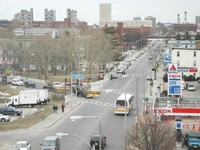According to Spiegelman, the University is in “discussions” with the owners of the low-income housing complex to purchase the buildings. In the past, Harvard has proposed building a brand-new complex for the residents elsewhere in Allston.
Last December, tenants in the building complained that they were being left out of negotiations as University officials and Charlesview owners met.
After more than two years of talks, the owners and Harvard have not yet come to a resolution.
AT A CROSSROADS
As discussions about the future of Allston and the fate of Charlesview continue, residents acknowledge that the relationship between the University and the community has come a long way.
When Harvard announced in 1997 that it had used a front company to secretly purchase 52 acres of Allston land, Boston Mayor Thomas M. Menino told the Boston Globe it was “total arrogance.”
After the anger surrounding the announcement, representatives from Harvard, the city, and the community came together to create the neighborhood plan, known as the North Allston Strategic Framework for Planning, which was released in preliminary form last December after four years of meetings.
On Feb. 22, the Allston Brighton CDC sent a letter to the City of Boston questioning whether the scale of Harvard’s expansion in Allston was too big.
“We are concerned that the overall scale and density that seem to be embedded in the [plan] are not reflective of what the community desires or what will preserve and enhance North Allston’s neighborhood character,” the letter states.
The task force responsible for creating the plan met last week to discuss the CDC’s concerns. Van Meter says the task force recommended to the city that “language be taken out of the document.”
“My sense is that there will be some changes in the form of deletion before it’s made final,” Van Meter says.
He adds that he and other task force members are also concerned that the framework does not include enough information about the construction of affordable housing in the community.
“What we don’t want to happen is see a document receive official legitimacy that doesn’t represent the neighborhood’s views,” Van Meter says. “There are many positive things, but issues of density and scale are fundamental.”
Nevertheless, Harvard can proceed with the development of its master plan even if the neighborhood’s framework is not finalized.
“Technically, we don’t have to have a strategic plan, but it turns out to be a positive thing because it made people think about…issues,” Spiegelman says.
Read more in News
Sigma Chi Frat Still Homeless After Failed Bid













